Sector-specific Cash and Voucher Assistance
CVA can help people in crises address their needs within a specific humanitarian sector, such as water, food, health, shelter, livelihood, or protection. Sector-specific CVA can be restricted or unrestricted, and conditional or unconditional, and will typically be provided as part of a comprehensive package which may also include in-kind and service-based assistance.
Each sector has to consider different questions, challenges, advantages and risks when it comes to supporting people’s recovery within their area of expertise. This requires evidence, tools, guidance and capacity. Meeting sector-specific outcomes through CVA also requires a multi-sectoral understanding of needs and of household economic security – see Multipurpose Cash Assistance. While some sectors are very experienced in implementing CVA and have done so for many years, others are now catching up. Most humanitarian sectors are committed and have been increasing their efforts on sector-specific CVA. The Global Cluster Coordination Group (GCCG) is also coordinating cross-cluster work to improve the sectoral used of CVA.
Current priorities
The CALP Network works closely with the cash technical groups/task teams within the global clusters, who have been defining their 2020 priorities and workplans during their regular meetings. A general overview and specific details of these priorities across each global cluster is available here.
Sector-specific CVA subpages
Camp Coordination, Camp Management and Cash and Voucher Assistance
Page
Find out more about Camp Coordination and Camp Management (CCCM) in relation to Cash and Voucher Assistance (CVA). For the most up to date information visit the Global CCCM Cluster’s website.
Education and Cash and Voucher Assistance
Page
A brief introduction as to how Cash and Voucher Assistance (CVA) can support education outcomes. For the most up to date information please visit the Global Education Cluster’s website.
Food Security and Cash and Voucher Assistance
Page
A brief introduction as to how Cash and Voucher Assistance (CVA) can support food security outcomes. For the most up to date information please visit the Food Security Cluster Cash and Market Working Group web page.
Health and Cash and Voucher Assistance
Page
The content on this webpage has been developed with the Global Health Cluster.
Nutrition and Cash and Voucher Assistance
Page
Malnutrition continues to pose a major challenge to human well-being around the world. In 2020, an estimated 144 million children under five suffer from stunting (i.e. chronic malnutrition) , 47 million children under five were wasted (i.e. acute malnutrition) , of which 14.3 million were severely wasted, and an additional 340 million suffered from micronutrient deficiencies (UNICEF/WHO/WB...
Protection and Cash and Voucher Assistance
Page
How can Cash and Voucher Assistance (CVA) support protection outcomes? Please find a brief summary below, and for the very latest information, refer to the Global Protection Cluster Task Team on Cash for Protection.
Shelter and Cash and Voucher Assistance
Page
How can Cash and Voucher Assistance (CVA) support shelter outcomes? Please find a brief summary below, and for the very latest information, refer to the Shelter and Cash Working Group.
WASH and Cash and Voucher Assistance
Page
How can Cash and Voucher Assistance (CVA) support WASH outcomes? Please find a brief summary below, and for the very latest information, refer to the WASH Cluster’s Cash and Markets Technical Working Group.
Latest

A Review of Evidence of Humanitarian Cash Transfer Programming in Urban Areas
Report
Urban poor populations frequently experience disasters of varying typology and intensity. When set against a backdrop of poverty and marginalisation, their needs can be complex. As recent urban crises have pushed humanitarian agencies to respond in urban areas, this literature review examines the...

Exploring Food Assistance Programmes: Evidence for Lebanon
Report
The purpose of this study is to analyse how markets in Lebanon have responded to the increased demand from the Syrian refugees. More specifically, the study focuses on the micro-level impacts of market-based food assistance on the market supply chains and market performance. It explores the pros and cons...

Research on Food Assistance for Nutritional Impact (REFANI): Literature review
Report
The REFANI literature review identifies existing evidence on the use of Cash Transfer Programmes (CTPs) and the impact of CTPs on acute malnutrition in humanitarian contexts. The review is structured as follows: Section A discusses the global burden of acute malnutrition; Section B highlights...
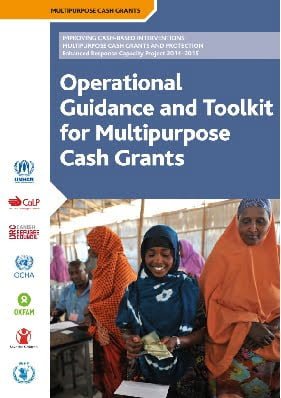
Operational Guidance and Toolkit for Multipurpose Cash Grants
Guidelines and Tools
This operational guidance and toolkit brings together worldwide expertise on cash-based interventions (CBIs). It provides comprehensive and practical guidance for humanitarian actors to assess the feasibility, conceptualise the design and structure the implementation of MPGs. The guidance focuses on...

Cash Transfer Programming for Syrian Refugees: Lessons Learned on Vulnerability, Targeting, and Protection from the Danish Refugee Council’s E-Voucher Intervention in Southern Turkey
Report
DRC Turkey is currently implementing a two-year, DFID-funded project that aims to provide immediate support to and strengthen the coping mechanisms of vulnerable non-camp Syrian refugees in southern Turkey. The first phase of the project focused on identifying and providing monthly cash transfers (in the...
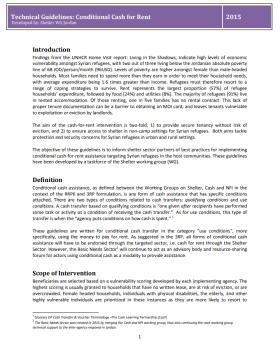
Technical Guidelines: Conditional Cash for Rent
Guidelines and Tools
The guideline was prepared by UNHCR Shelter Working Group in Jordan with the objective of informing shelter sector partners of best practices for implementing conditional cash-for-rent assistance targeting Syrian refugees in the host communities. The guide explores how to define the scope of a cash...

Philippines Haiyan Response – A multi-sectoral review of the use of market analysis and the design and implementation of CTPs
Report
Following Typhoon Haiyan, which hit the Philippines on November 8 2014, at least 45 aid agencies chose to implement Cash Transfer Programming (CTP) to assist the more than 16 million people affected. Cash transfers were a logical approach in a country with developed market systems, strong financial...

Value for Money of Cash Transfers in Emergencies
Report
The objective of this study is to analyse evidence on the Value for Money (VfM) of cash transfers. The study reviews evidence on the economy, efficiency and effectiveness of cash, vouchers and in-kind transfers, in order to support a more structured analysis of the VfM of different transfers. It is based...
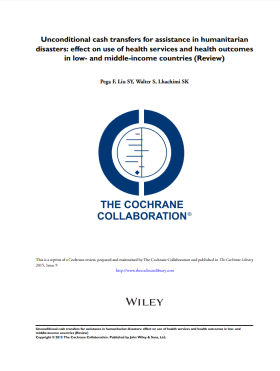
Unconditional Cash Transfers for Assistance in Humanitarian Disasters: Effect on use of health services and health outcomes in low- and middle-income countries
Report
Unconditional cash transfers (UCTs) for humanitarian assistance during disasters may improve health in low- and middle-income countries (LMICs) by giving recipients additional income. This study sought to assess the effect of UCTs on health services use, health outcomes, social determinants of health,...
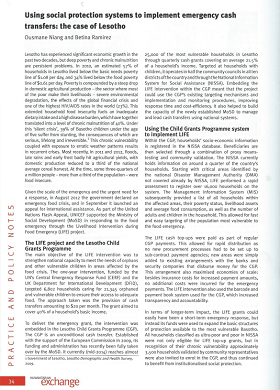
Using Social Protection Systems to Implement Emergency Cash Transfers: The case of Lesotho
Case Study
Lesotho has experienced significant economic growth in the past two decades, but deep poverty and chronic malnutrition are persistent problems. Given the scale of the emergency and the urgent need for a response, in August 2012 the government declared an emergency food crisis, and in September it...
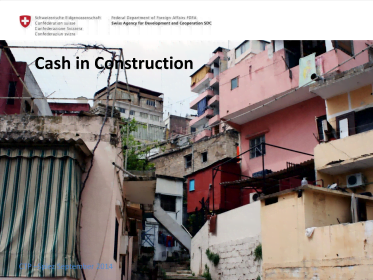
Cash in Construction
Presentation
This Powerpoint was used by SDC during a workshop on CTP and shelter/construction that took place in mid 2014. Click here to download a short introduction Powerpoint on Cash and Shelter from the same event.
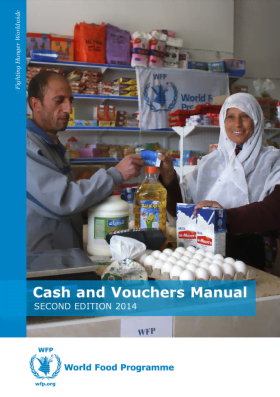
Cash and Vouchers Manual – Second edition
Guidelines and Tools
This second edition of the Cash and Vouchers Manual captures the latest corporately endorsed business processes and procedures, providing the most up-to-date tools (i.e. analytical, assessment, monitoring) that have been developed through close intra-departmental collaboration between Headquarters...
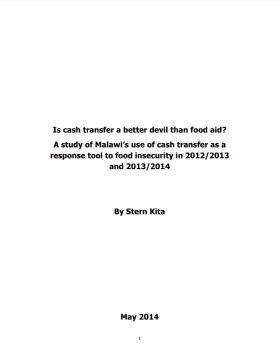
Is Cash Transfer a Better Devil than Food Aid? A study of Malawi’s use of cash transfer as a response tool to food insecurity in 2012/2013 and 2013/2014
Report
The 2004 Indian Ocean Tsunami is considered as the first humanitarian situation where cash transfers were used as an alternative to food aid. Since then, cash transfers have been used as a standalone response tool to disasters, or used in combination with food aid. Malawi piloted the use of cash...
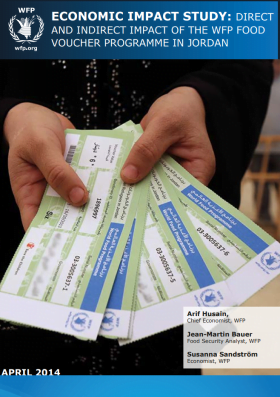
Economic Impact Study: Direct and indirect impact of the WFP food voucher programme in Jordan
Report
The intent of this study is to estimate the economic benefits of the food voucher programme implemented by the World Food Programmeme (WFP) for Syrian refugees in Jordan. The study employs a two pronged approach whereby the first component provides an analysis of the supermarkets that participate in...
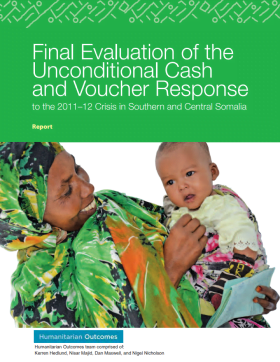
Final Evaluation of the Unconditional Cash and Voucher Response to the 2011–12 Crisis in Southern and Central Somalia
Report
This report sets out to determine the effectiveness of the unconditional cash and voucher interventions in southern and central Somalia. This evaluation however cannot be limited to the interventions at hand. It necessarily considers the broader context that led to the failure of the humanitarian...
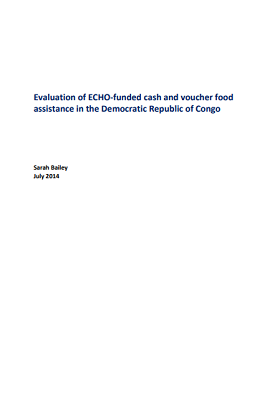
DRC Cash and Vouchers Food Security Evaluation (2014)
Report
People in eastern Democratic Republic of Congo (DRC) have long faced protracted conflict and instability resulting in the displacement of populations. In order to provide households affected by new displacements with timely access to food, ECHO funded the Norwegian Refugee Council (NRC), the Association...
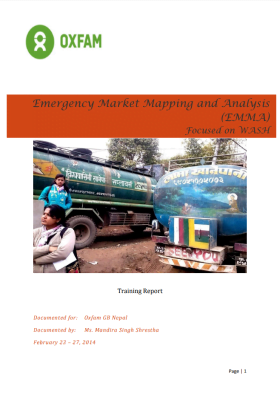
Training Report – Emergency Market Mapping and Analysis (EMMA): Focused on WASH
Report
Emergency Market Mapping Analysis (EMMA) is a toolkit guidance manual for humanitarian staff in sudden-onset emergencies which aims to improve emergency responses by encouraging and assisting relief agencies to better understand, support and make use of local market-systems in disaster zones. EMMA offers...
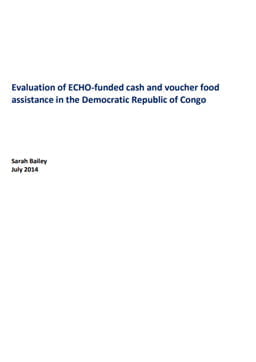
Evaluation of ECHO-Funded Cash and Voucher Food Assistance in the Democratic Republic of Congo
Report
People in eastern Democratic Republic of Congo (DRC) have long faced protracted conflict and instability resulting in the displacement of populations. In order to provide households affected by new displacements with timely access to food, ECHO funded the Norwegian Refugee Council (NRC), the Association...
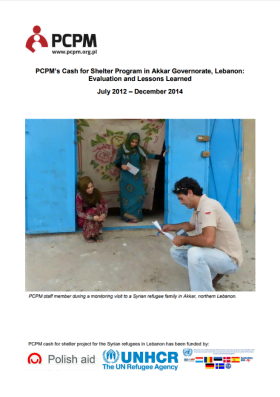
PCPM’s Cash for Shelter Program in Akkar Governorate, Lebanon: Evaluation and lessons learned
Report
The aim of this report is to provide an evaluation of the activities of Polish Centre for International Aid (PCPM) cash for shelter programme in the Akkar district in Lebanon. The evaluation has been focused on the long-term results of the humanitarian aid provided by PCPM to the Syrian refugees in Akkar...

Support to the local tool market post-Typhoon Haiyan
Report
Super Typhoon Haiyan struck Leyte and Eastern Samar in the Philippines in November 2013. CRS responded by initiating a program in 2014 to support the livelihoods recovery of 5,250 agriculture-based households. The Livelihood Early Recovery Support to Agricultural Households Affected by Typhoon Yolanda...